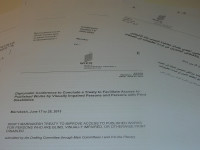While the media focus has unsurprisingly been on Budget 2016, the government has quietly moved to introduce copyright reform legislation that will allow Canada to implement the Marrakesh Treaty to Facilitate Access to Published Works for Persons Who Are Blind, Visually Impaired or Otherwise Print Disabled. The notice paper for Wednesday, March 23rd includes an Act to amend the Copyright Act with specific provisions on access to copyrighted works or other subject-matter for persons with perceptual disabilities. The decision to implement the Marrakesh Treaty is long-overdue. The Conservatives announced plans to do so in last year’s budget but waited to table legislation days before the summer break and the election call. With that bill now dead, the Liberals have rightly moved quickly to revive the issue.
The treaty expands access for the blind by facilitating the export of works to the more than 300 million blind and visually impaired people around the world, which is needed since only a tiny percentage of books are ever made into accessible formats. Further, it restricts digital locks from impeding access, by permitting the removal of technological restrictions on electronic books for the benefit of the blind and visually impaired. The last bill featured changes to Canada’s digital lock rules that demonstrated (yet again) that the rules are overly restrictive and in need of amendment. The bill should be introduced as soon as Wednesday with analysis to follow.










